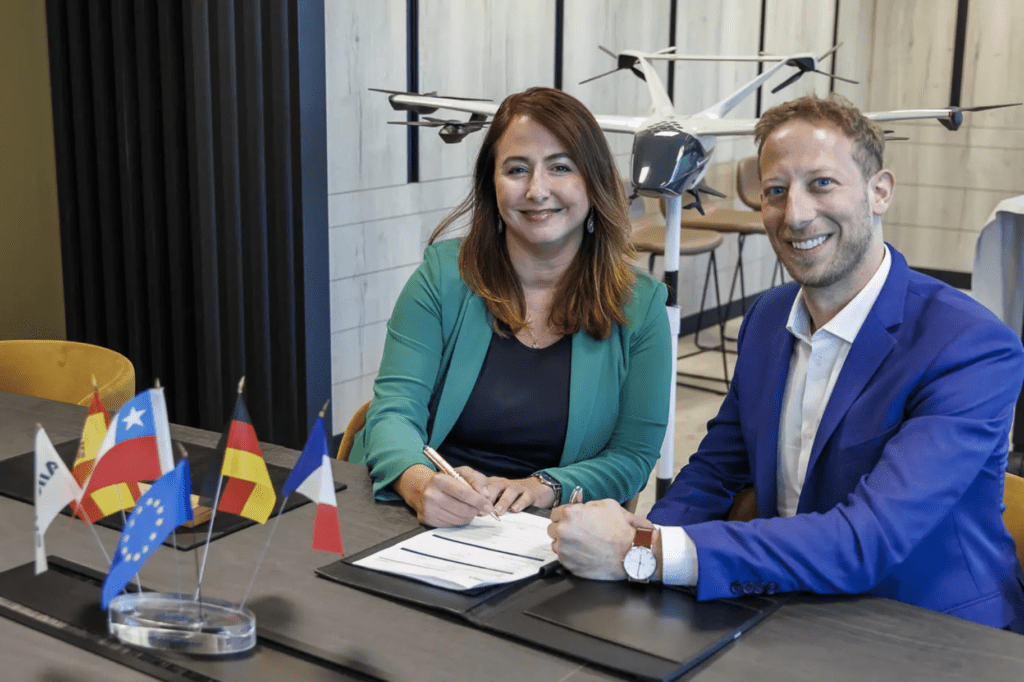
Ecocopter and Airbus signed a Memorandum of Understanding in September for the launch of urban air mobility operations in Latin America. (Photo: Ecocopter / Airbus)
Airbus signed a Memorandum of Understanding last month with helicopter operator Ecocopter to collaborate in launching urban air mobility services in Latin America. Ecocopter’s fleet is primarily made up of Airbus helicopters, which are used to perform missions such as medical evacuations, firefighting, and offshore transport.
Ecocopter and Airbus have a strong preexisting relationship. Their recent agreement involves exploring strategies for launching urban air mobility (UAM) operations in Latin America and in particular Chile, Peru, and Ecuador. “This partnership leverages Airbus’ expertise in innovative vertical flight technologies, and Ecocopter’s extensive operational history,” commented Balkiz Sarihan, Head of Partnerships & Strategy Execution for UAM at Airbus, in response to the announcement.
About a year ago. Airbus revealed the prototype for its CityAirbus NextGen, an electric take-off and landing (eVTOL) aircraft. The company is also leading the Air Mobility Initiative, announced in May, to evaluate the requirements of integrating eVTOL aircraft—and other advanced air mobility (AAM) vehicles—into the airspace. Diehl Aerospace, the University of Stuttgart, Red Cross, Munich Airport, Telekom, and Droniq are some of the participants in this initiative.

(Photo: Ecocopter)
Ecocopter signed the agreement with Airbus to evaluate requirements for a UAM ecosystem in addition to use cases and launch cities for the CityAirbus NextGen. The team at Airbus “are in a position where they are not trying to sell anything yet; it is not a startup that needs LOIs or MOUs, they are on a different path,” explained Marcelo Rajchman, Ecocopter’s Corporate CEO, in an interview with Avionics International.
“It’s not easy to build an eVTOL or any new aircraft,” he continued. “You can build a demonstrator, but it’s not easy to get the certification or a production line. Airbus has been building its VTOL for many years through various initiatives and projects. We believe they will achieve a successful product.”
In the AAM space, the main focus is on the aircraft themselves, and the majority of investment in the industry has gone into OEMs. Not enough thought has gone into the larger ecosystem and making eVTOL flights economically viable, Rajchman believes.
“It would be hard to find someone better than [Ecocopter] as operators who really know the clients,” he said. The company has experience operating aircraft in Chile, Peru, and Ecuador seven days a week in all kinds of conditions. Flying eVTOLs in a city like New York or Chicago is one challenge, but a successful eVTOL company should be able to operate anywhere in the world—”especially in complicated environments,” he added.

(Photo: Ecocopter)
Ecocopter will be able to help Airbus understand their future customers and demand for eVTOL services in Latin America, explained Rajchman. “Ecocopter has ambitions to not only be an operator but to be more involved with maintenance centers and training centers,” he noted.
Some eVTOL developers plan to launch commercial operations in the next two years. Rajchman is somewhat skeptical of this timeline, but he expressed confidence that these aircraft will be flying within the next 8 years, and maybe sooner. “I’m not sure if it’s going to be as cheap as these OEMs are telling investors it will be,” he said.
Ecocopter is launching helicopter services in a fourth country in South America. For the helicopter industry, firefighting applications are continuing to grow, shared Rajchman. Ecocopter’s drone business is also growing exponentially with operations in Chile and plans to open offices in the U.S. and Brazil in the near future. He stated that the company will be launching a platform for cargo VTOL operations, similar to other B2C digital platforms, with assistance from Airbus. Ecocopter will start collecting data via this platform beginning in Chile and Peru.